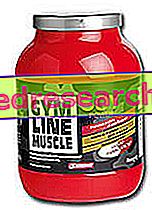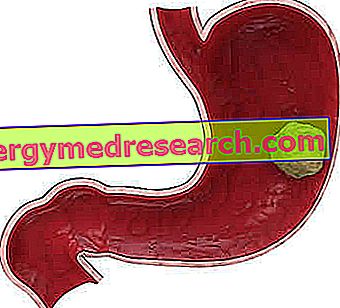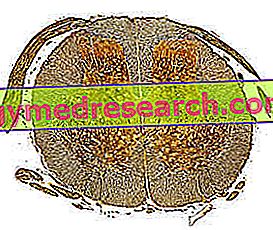What is collagen
Collagen - better known as gelatin - is the body's most abundant protein, where it concentrates in particular on bones, tendons, cartilages, skin, membranes and blood vessels.

At the skin level, collagen helps to maintain the firmness, tonicity and firmness of the skin, minimizing the presence of wrinkles. In fact, it is present at the level of the dermis where - together with elastic fibers and glycosaminoglycans - it gives rise to that three-dimensional structure that supports and supports the skin, giving it resistance and elasticity.
Unfortunately, the synthesis of collagen decreases with aging, while its degradation increases and with it the roughness of the skin, which becomes less compact and thinner.
For this reason, collagen supplements are widely used in anti-aging nutraceuticals; the ingredient is also quite common in cosmetic products.
Naturally, the degradation of collagen due to the phenomena of aging occurs in the skin as much as in the other districts where there is the presence of connective tissue, such as, for example, tendons and cartilages. Not surprisingly, the market offers a wide variety of collagen supplements specially formulated to contribute to the well-being of the osteoarticular system.
Food Collagen
Collagen is particularly represented in the animal world; as such, it is introduced into the body mainly through meat foods. High percentages of collagen reduce the digestibility of the food and explain the greater digestibility of the fish compared to meat, richer in connective tissue.
Collagen is synthesized by the body from the individual amino acids that make it up. From a nutritional point of view, it is particularly rich in glycine, proline and hydroxyproline, while it is deficient in sulfur amino acids. Precisely because it is rich in these amino acids necessary for its synthesis, food collagen, after having been digested and broken down into the single amino acids that make it up, can stimulate or at least promote its re-synthesis in the body.

Anti-oxidant supplement Antiage X115 + Plus
New generation anti-aging supplement. Double Day & Night formulation with high concentration of assets; supports and optimizes antioxidant defenses and stimulates the synthesis of collagen, hyaluronic acid and elastin . " More information "
Collagen supplements
Composition of Collagen Supplements
Naturally, the main ingredient of collagen supplements is represented by this precious protein which, however, being large in size, is difficult to digest.
To overcome this drawback, in the supplements that contain it, collagen is often present in a hydrolyzed form (hydrolyzed collagen ) - therefore partially digested - so as to favor intestinal absorption, reducing its gelling power (highly appreciated in confectionery). The collagen used in these products derives largely from bones, skins and animal connective tissues, such as cattle, pigs and horses; although, nowadays, many producers prefer to use marine collagen, of fish origin (see paragraph: Risks).
Curiosity
Even on a cosmetic level, the application of collagen as such cannot be considered functional, as the protein is too large to be absorbed. It is precisely for this reason that even in quality cosmetic products it is preferred to use collagen in hydrolyzed form or small peptides precursors such as Palmitoyl Pentapeptide-4.
Depending on the condition (imperfections of the weather, joint disorders, etc.) that the supplement aims to improve, inside the formulation - in addition to collagen - you can add other active ingredients.
For example, collagen in combination with glucosamine and / or chondroitin sulfate is part of the composition of supplements designed to promote joint well-being, preventing arthrosic processes (degradation of articular cartilage) and supporting recovery from traumatic events.
In antiaging supplements, on the other hand, in addition to collagen - or as an alternative to it - you can find substances that can preserve this protein from degradation, or stimulate its synthesis by fibroblasts and chondrocytes (respectively skin and cartilage cells responsible for producing collagen); this is the case, for example, of vitamin C and centella asiatica extracts titrated in asiaticoside.
Furthermore, collagen is often combined with hyaluronic acid, a substance of high molecular weight that retains large amounts of water at the level of the skin and joint fluid, protecting skin and joints from damage related to aging processes. The combination of collagen-hyaluronic acid, therefore, can be very useful both in anti-aging products and in supplements for the well-being of bones and joints. Furthermore, in the field of aesthetic medicine, collagen and hyaluronic acid can be injected (alone or in combination) as filler agents directly into the skin.
Collagen synthesis can also be enhanced by the integration of single amino acids, such as arginine, hydroxyproline and ornithine.
Did you know that ...
Growth hormone (GH) also has positive effects on collagen synthesis, while dihydrotestosterone appears to favor its degradation. Estrogens, on the other hand, seem to favor collagen synthesis, and perhaps for this reason soy isoflavones (genistein) have shown - in vitro - to stimulate collagen synthesis.
Of course, hormones cannot possibly be included in the composition of common food supplements, since their use is authorized only and exclusively in the medical field for the treatment of certain conditions and pathologies.
Recommended doses
The doses of intake normally recommended are rather generous, in the order of 1-10 grams of collagen a day. However, if the diet is balanced and optimal, without specific deficiencies, it is unlikely that the exogenous supply of collagen in large quantities could stimulate the ex-novo synthesis of the same; more than swallowing large doses of collagen, it would therefore make more sense to integrate the substances that favor its synthesis and prevent its degradation, such as antioxidants and the aforementioned echinacea extracts (see the proposed formula of the double action supplement reported in the figure).
Side effects
Undesirable effects of Collagen Supplements
Being a protein food, there are no contraindications or significant side effects to the common doses of use.
However, hypersensitive individuals may experience allergic reactions or complain of gastrointestinal disorders.
risks
Potential Risks Related to the Intake of Collagen Supplements
Considering that collagen is obtained from carcasses and waste from animal slaughter, there are concerns about the possibility that gelatine will act as a vector for the transmission of TSE-BSE (transmissible spongiform encephalopathies, among which the mad cow disease stands out for its reputation). In theory, the processes of heating, filtration and alkalisation of animal remains should be effective in eliminating, or at least reducing, the levels of infectious agents (prions) that transmit TSEs. Furthermore, the law that regulates and regulates the production of supplements based on this protein involves the execution of a series of rigorous controls, precisely in order to protect the health of the final consumer.
Despite this, most producers (both food supplements and cosmetic products) prefer to include marine collagen (ie, collagen of fish origin), or vegetable collagen (Natto Gum) in their formulations.
More information on the Anti-Wrinkle Benefits of Drinking Collagen



